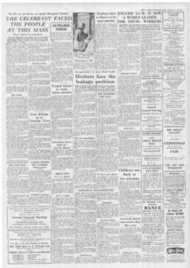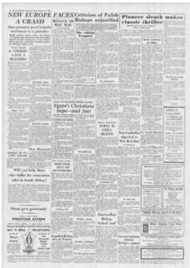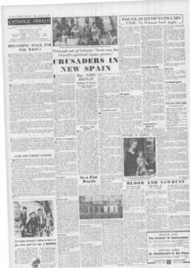Page 5, 31st October 1952
Page 5

Report an error
Noticed an error on this page?If you've noticed an error in this article please click here to report it.
Tags
Share
Related articles
Priest's Experience
Fortitude And Temperance, By Josef Pieper
Let The People Sing
Plainsong, English And The People
Hymns A & M
How Do They Misread Me?
'SINCE SINGING IS SO GOOD A THING.?
By Fr. Clifford Howell, S..I.
HYMNS AND HUMAN LIFE, by Eric Routley, B.D., D.Phil. (Jain Murray, 16s.).
DR. ROLA LEY has written a truly fascinating book. "Hymns," he says, "arc the folk-song of the church militant. I hey are essentially the people's music." Beginning from the Psalms and the "spiritual canticles" sung by the early Christians (of which some fragments are preserved for us in St. Paul's Epistles), the author traces the gradual development of this particular form in which Christian worship has become articulate.
Men who are caught up in any kind of "movement" have always felt the need to express their enthusiasms in song in order to bear witness to their convictions, to hind themselves together in unity against adversaries, and to urge themselves on to the pursuit of their ideals. At different periods in history any one of these motives may predominate over the other two, and thus we find what might be termed credal hymns, battle hymns and devotional hymns, wish coming to the fore in turn. But throughout the whole of history there is constant evidence of the great power which vernacular hymns have exercised over the minds and wills of men. It is small wonder that the Pope, in Mediator Dei, exhorts the Bishops to "encourage congregational religious singing; for it does much to enliven and increase the devotion of the faithful."
'Sung into heresy'
ST. JOHN CHRYSOSTOM made great use of vernacular hymns to deepen and stabilise the faith of his people against the attacks of the Arians; St. Ambrose so appreciated their value that he incorporated them into the Divine Office. (I.atin was, of course, the vernacular of his flock. in those days.) During the next thousand years further hymns developed within the liturgy in the form of Sequences. and outside the liturgy as elements in popular religious festivals, fairs and mimes. And so we come to the great upheavals of the I6th century.
Although, as Catholics, we can hardly share the enthusiasm of Dr. Roulley for the persons of Luther and CaIvin, we would do well to learn the lesson which he so clearly demonstrates from their work, namely, that vernacular hymns can be used to exert a tremendous influence over the people, It has been truly said that "far more people were sung into heresy than were ever argued into it."
Beyond doubt one of the chief factors which contributed to the spread of Protestantism was the highly attractive repertoire of fine vernacular hymns set to noble tunes which men could sing in Protestant worship; whereas in the Catholic churches they were "silent and detached spectators," merely listening to clerics singing unintelligible Latin to very decadent Plainsong.
Vernacular at Mass
THOUGH Dr. Routley does not 1 happen to mention it, we may recall here that in order to counter the attractiveness of the Protestant services the Catholic Church in Germany began about this time to introduce the practice of singing at Mass vernacular hymns specially written to fit the various parts of the Mass.
In the course of time this has developed into the "German High Mass" now authorised by the Holy See for all German-speaking coun t r ie s, wherein both the Proper and the Common are sung in German, not in Latin.
Non-Catholic hymns
AS one would expect. the subject which is most exhaustively treated in this book is the wealth of English hymns produced by Anglicans, Methodists and Nonconformists of all types. The story is very well told, with deep scholarship tempered, however, with engaging humour.
Our Catholic hymnody is not ignored and several interesting facts emerge-for instance, that "Faith of Our Fathers" was, for a while, sung with gusto by Congregationatists! They did not, however, take over the trite and jerky tune which is, alas, normally associated with those words in our own churches.
The book is marred'by an inexcusable number of misprints.
* William Byrd said:
Since singing is so good a thing I wish all men would learn to sing.
blog comments powered by Disqus







